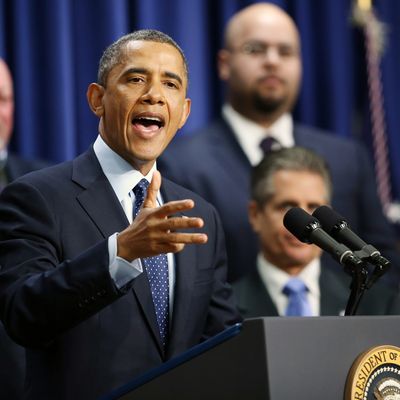
My initial reaction to the emerging budget deal was, well, not entirely positive. As more details of the emerging deal leak out, it seems less bad, depending entirely on how the next steps play out. What we have now is a spectrum of outcomes that will play itself out over the next few months, ranging from “okay” to “terrible.”
The basic gist is that President Obama traded away long-term revenue — that is, his best chance to fund the government at adequate levels — in order to keep the economic recovery going. Obama had insisted for months on end he could not accept extending the Bush tax cuts on income over $250,000 a year, and the expiration of the Bush tax cuts gave him the power to back up his pledge. Now Obama has agreed to settle for less revenue — ending the Bush tax cuts on income over $450,000 a year.
He’ll make up some of the lost revenue by reintroducing a complex mechanism called Pep and Pease that reduces income tax deductions for high-income earners. (Read about how it works here. Or don’t. You’re not going to read it, are you?) The key thing here is that this is a worse way for Obama to raise the tax revenue; because, by reducing tax deductions for the rich, it takes money off the table that could be raised by future tax reform. If Obama had raised the revenue through straight rate hikes, as he initially proposed, he could go back later and get more revenue through tax reform. Now he has cannibalized a chunk of any future revenue haul.
What did Obama get in return for giving Republicans smaller tax hikes on the rich? He got a one-year extension of unemployment benefits, wind energy tax credits, and other temporary measures. In other words, he’s buying a little insurance to keep the recovery going in return for sacrificing long-term revenue. That’s a poor bargain but not an awful one.
What the tax deal fails to do is alleviate the looming threat of economic dysfunction posed by House Republicans. Two unresolved items remain. The first is the rest of the “fiscal cliff”: a trillion dollars in automatic spending cuts scheduled to unfurl over the next year. Both sides hate the cuts and have vaguely agreed to replace them with something better. Obama insisted in his speech today that he will only accept an even split between spending cuts and tax revenue. Republicans blew up in outrage over this demand — Obama “just moved the goalpost again. Significantly,” tweeted Mitch McConnell’s spokesperson.
Reporters immediately began to obsess over the possibility that these remarks upset the delicate balance holding the deal into place and increased the chances that angry House Republicans will scotch the whole thing. On the other hand, it would be totally irrational for Republicans to vote down a favorable deal merely because they’re angry. On the third hand, House Republicans are irrational.
If Obama struck this deal without lining up enough votes to pass it through the House, then he committed a huge blunder. All the Bush tax cuts will expire, and he’ll have given away a quarter of his revenue ask. Rather than demand House Republicans pass tax cuts for income under $250,000, he’ll be reduced to asking them to pass tax cuts for income under $450,000 — that’s what the two sides agree on. The whole gambit of re-routing a deal through the Senate will turn out to be an epic tactical blunder.
Even if the House passes the bargain, we’ll soon find ourselves facing the other major economy-threatening event: The next vote, sometime in February or March, to raise the debt ceiling. Here, too, Obama and the Republicans disagree about how to proceed. Obama insists he won’t let Republicans use the vote to extort policy concessions (which they did in 2011, something that had never happened before.) Republicans firmly believe they can and will.
So what we have is two more showdowns in which the parties disagree not just on the outcome but even on the parameters of an outcome. Obama thinks the debt ceiling needs to be raised, full stop, without becoming a bargaining chip in a fight that threatens the stability of the global economy. Republicans want to use that chip. Then there’s the sequester, which Obama thinks should be replaced with spending cuts and tax revenue, and Republicans think should be replaced with spending cuts and more spending cuts.
If Obama makes it through both these events without either accepting draconian social policy or triggering an economic meltdown, then today’s compromise will be seen as a clever first step. That’s not what I expect. I expect instead that his willingness to bargain away his strongest leverage, and the central theme of his reelection, will make the next rounds harder, and embolden Republicans further. I suspect he will wish he had ripped off the Band-Aid all at once, holding firm on tax cuts and daring House Republicans to defy public opinion.






























